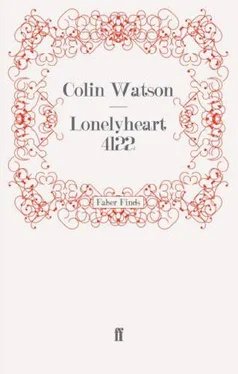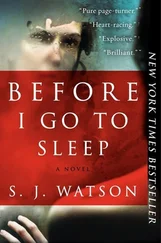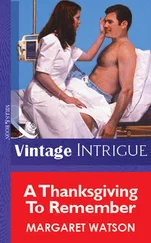Love looked surprised. “A priest?” In his limited religious experience the word had an exotic ring. He had a fleeting vision of a figure in voluminous robes pouring tea like sacrificial wine.
“I think so. Very dark clothes and hands like so.” She joined the tips of her fingers. “And all the time he is looking very sad at my legs.”
“Oh, you mean a clergyman,” Love said.
“I think. Yes.”
“Can you describe him?”
The girl pouted doubtfully. Oo, you little smasher, said the sergeant to himself.
“A man,” she said. “Not young. Not as young as you.” Love glowed. “But with a...a something—you know?” Had he a something, the sergeant wondered, hoping very much that he had.
“Is there anything else you can think of? Colour of eyes or hair?”
“Oh, yes. Not dark hair. Colour like...” She rippled fingers in the air, seeking a comparison within what vocabulary she had acquired, then brightened. “Like chips!”
Purbright seemed quite pleased with his sergeant’s report.
“You’ve gathered more than I expected, Sid. I wish I had your way with women.”
“I wouldn’t have thought the descriptions were much help.”
“They seldom are, unless they include six-inch scars or a club foot. The point is that we now have a much clearer idea of the kind of man we’re looking for—his line of business.”
“A clergyman who writes books, you mean?”
“Not at all. What we have to find is a non-clergyman who doesn’t write books.”
“That ought to be easy,” said Love, hoping he was keeping his end up in the matter of trading ironies.
“Not easy,” Purbright qualified, “but less difficult in the context of Flaxborough society than looking for, say, an embezzler or a fornicator. A needle is much simpler to find in a haystack than in a bin of other needles.
“Now then, whoever won the affections of Miss Reckitt and Mrs Bannister is obviously a professional or semi-professional con man. Among these people there is quite narrow specialization. The bogus charity collector does not cross into the territory of the encyclopaedia salesman. Nor does the inventor in need of capital to market his everlasting petrol capsule work overtime as a spirit guide.”
“Remember that bloke,” Love interrupted, “who was supposed to have put old Alderman Wherry in touch with Edward the Seventh?”
“Just so,” said the inspector. “A full-timer. They hung eighty-three taken-into-considerations on him.
“But to get back to the business in hand. Here we have another kind of full-timer. The con man who’s forever pointed towards an altar. He’s probably the hardest worker of them all. Think of a life that is perpetual courtship of the last woman on earth you’d care to marry. That’s real graft, Sid.”
Sergeant Love, who was finding even his own restricted and unambitious wooing a bit of a strain from time to time, looked suitably awed.
“So you see we are not looking for an ordinary criminal,” Purbright went on. “We seek a man who can pose convincingly as an author, probably as a clergyman, and possibly as other romantic things. It would be interesting to know what he is at the moment.”
“A surgeon,” suggested Love, a quick learner.
“Aye, very likely. Plenty of tuck in his jacket sleeve to show off long, sensitive hands, and a sprinkle of Dettol behind the driving seat.”
“What about a secret agent?”
Purbright looked dubious. “Strictly for mentally retarded shop girls, I would have thought. Our man’s a cut above trading on the Bond syndrome.”
“Clever,” Love said, “the way he covered his tracks by getting those letters back from Mrs Bannister.”
“Quite. And we’ve got precious little from the three he didn’t recover. Not even a print, apparently. I wonder how they corresponded between meetings. Without his having to give his address away, I mean.”
“Through some sort of box number, maybe. Could have been the post office.”
“Box number...” Purbright murmured. For some reason, the thought of twenty-one pounds insinuated itself. Twenty guineas. The professional touch. Guineas. Fee. Client.
“Sid,” he said suddenly, “isn’t there one of those matrimonial agencies somewhere in town?”
The question seemed to take a second or two to register. Then Love straightened in his chair.
“That name...”
“What name?”
“On the cheque. Stench...Staunch.” He snapped his fingers. “That’s it—she runs a marriage bureau thing somewhere in Northgate. Where the Liberal Club used to be.”
Purbright rewarded the sergeant with a beam of affability, then looked at his watch. “I’ll go over now. What do you think I ought to ask for, a catalogue?”
Northgate was one of Flaxborough’s more run-down thoroughfares. Older people could remember when it had been “select”—the preserve of the kind of shopkeepers who saw their customers to the door and sent accounts headed “Bot. of...” At one time as many as four of its tall, double-fronted houses had been graced with the brass plates of doctors. No inn had ever been suffered there, and no chapel either, for Northgate’s residents and men of business held in equal abhorrence the vulgarity of public victualling and Methodism’s shrill abstinence. It was a street in which one could picture the aristocratic chemists having actually made up prescriptions from the great jars of gilded porcelain and the gigantic tincture bottles in their windows. There would have been a traffic in hat boxes and packets of gingerbread and Gentlemen’s Relish on the way home to side doors lettered in enamel No Hawkers: No Circulars .
But all that was long ago. With the shift of the town’s commercial axis to East Street on the other side of the river, first prosperity and then dignity had drained from Northgate like sap from a tree. The doctors had departed and their mansions had become tenements or the offices of car accessory firms. Behind the engrimed bow windows of chemists and saddlers and confectioners, there went on the dark labour of cycle repairers and the renovators of sofas. The premises of what once had been the town’s most magnificent provisions store now housed on one floor a refrigeration plant and some tons of frozen fish fingers and on the others the biggest stockpile of bottled sauce east of Manchester. As for the ban, so long sustained, upon Nonconformists and their bleak, hideous architecture, revenge had been taken by the enlargement with corrugated iron and match-boarding of the former carriage house of old Doctor Sanderson into a mission hall, complete with neon cross and posters that repeated the more offensive remarks of Old Testament prophets.
It was the baleful keening of the mission’s congregation (its apparently permanent session embraced the rarest intervals of silence) that droned through the thin walls to Purbright’s ear as he entered Northgate from Farrier Street. Drawing nearer its source, he wondered why religion—the western kind, anyway—laid such stress upon giving God praise. Never sympathy.
He crossed the road. It was pleasant to be warmed by the late afternoon sunshine and the inspector did not hurry. He did not despise seedy streets. Each had points of interest peculiar to itself. In Northgate there was a herbalist’s, for instance. He stopped at the narrow, dark window, and peered at the little piles of crumbled leaves and crushed root set out on kitchen saucers, each with a hand written reference to the organic effect promised. Especially intriguing was the card against slippery elm. “Makes delicious blancmange and is invaluable to the Family Planner (instructions over the counter).”
Farther along was a tobacconist’s. A row of tiny snuff bottles bore such names as Seven Dials, Senator, Barbara’s Muff, Voltaire and Pillycock. There was a photograph of Edgar Wallace above six dusty, foot-long cigarette holders looped to a display card. “The Latest Novelty,” proclaimed a ticket on a pipe fashioned in the likeness of a can-can dancer’s leg.
Читать дальше












